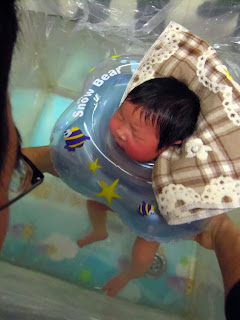I have discovered why it is difficult to ascertain the age
of Chinese women, as they never look their age. When a Chinese baby is born,
he/she is already considered to be a year old: age is calculated from the date
of conception not the date of birth. If I had been born in China, I could have
retired a year earlier.
Most new babies in China are now basically required to be named based on the ability of a computer scanner to read their names on their national identity cards. The government recommends giving children names that are easily readable and they encourage the use of Simplified characters over Traditional Chinese ones. Parents are technically free to choose a given name (father or mother) but will not allow the use of numbers and non-Chinese symbols and characters. There are over 70,000 Chinese characters but at present computers can only recognize 13,000.
Most new babies in China are now basically required to be named based on the ability of a computer scanner to read their names on their national identity cards. The government recommends giving children names that are easily readable and they encourage the use of Simplified characters over Traditional Chinese ones. Parents are technically free to choose a given name (father or mother) but will not allow the use of numbers and non-Chinese symbols and characters. There are over 70,000 Chinese characters but at present computers can only recognize 13,000.
The Chinese love massages and I believe I have discovered
why. A new born baby starts receiving massages while still in the hospital. It was
a wonderful sight to see the look of absolute contentment on Joy's face as she
received the gentlest of massages from one of the hospital staff.
Another service not available in Western hospitals is access
to a hot tub. After the massage, Joy was
fitted up with a tiny little personal floatation device that fit around her neck,
placed into a deep tub of warm water and allowed to float around. She
immediately fell asleep, like most of us want to do in a hot tub. What next, a
Pedi?
Chinese hospitals do not provide the same level of patient
care as we come to expect in a western hospital. Baby supplies like diapers and
wipes are not supplied. Janie’s mom had
a fully functioning laundry going on in the bathroom, to keep ahead of Joy’s
needs. Food is an expensive option, so
families are expected to provide meals for the loved ones. Janie’s mom pretty
well lived at the hospital along with Janie’s father and Justin.
If you are going to spend some time in a Chinese hospital, leave your Visa at home, they only take cash. Thankfully, not a lot is needed compared to western prices. Here is how it works. You go in with an ailment. You pay an admission fee to see the doctor. He may recommend some tests which you then go and pay for before proceeding to receive the tests or you may have to go and pay the costs after the tests to receive the results of the tests.
If you require any supplies such as intravenous solutions, antibiotics, catheters, even anesthesia you first must pay for it then pick it up and bring it with you when you return to the doctor with the test results. He completes the examination. He may refer you to a specialist. You once again return to the cashier to pay for your visit to the specialist. He may require further tests, which you then must go back to the cashier to pay for them. Getting the picture? So bring cash and a good pair of walking shoes.
If you are going to spend some time in a Chinese hospital, leave your Visa at home, they only take cash. Thankfully, not a lot is needed compared to western prices. Here is how it works. You go in with an ailment. You pay an admission fee to see the doctor. He may recommend some tests which you then go and pay for before proceeding to receive the tests or you may have to go and pay the costs after the tests to receive the results of the tests.
If you require any supplies such as intravenous solutions, antibiotics, catheters, even anesthesia you first must pay for it then pick it up and bring it with you when you return to the doctor with the test results. He completes the examination. He may refer you to a specialist. You once again return to the cashier to pay for your visit to the specialist. He may require further tests, which you then must go back to the cashier to pay for them. Getting the picture? So bring cash and a good pair of walking shoes.
After the birth, the mother is expected to observe a 40 day
period of confinement. During this period, she is not allowed to eat food
considered ‘cold’ or have cold baths: keeping warm, by the wearing of thick
clothes for example, is considered of paramount importance.
Diapers are an option in China but it can lead to some
interesting challenges. Nonie claims that Chinese children are taught from an
early age to only go to the bathroom when requested. Not sure what she had been
drinking when she heard this or who in fact told her this but a pee or a pooh
on request from any child has got to be the impossible dream. According to the Grandparents Handbook,
Version XII, these bodily functions will only occur at the least opportune
moments.
















































